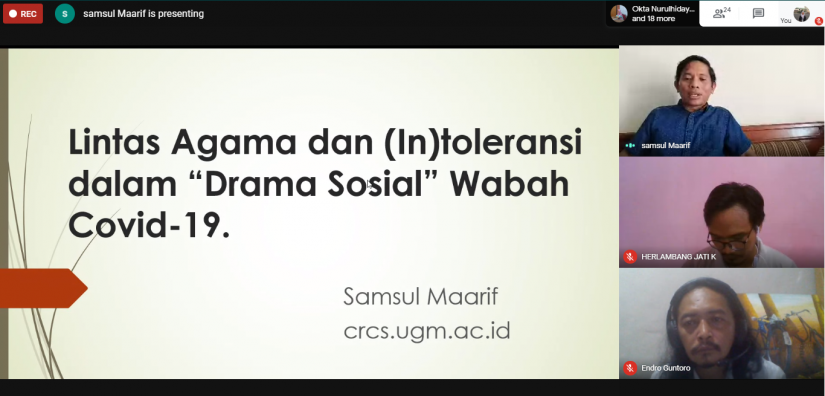
Yogyakarta, May 4th 2020— A discussion titled “Cross Religion Roles in Facing the Covid-19 Pandemic” was held through the Google meet platform by Fisipol UGM’s Department of Politics and Governance. The discussion was moderated by Herlambang Jati and the speaker was Samsul Maarif from CRCS UGM as well as FX Endro Tri Gundoro from Kebhinekaan Kidul Mountain School. The discussion gave a new perspective in analyzing the Covid-19 pandemic which is through the lens of cross religion movement.
“If we see the history of pandemic back at the sixth century, you can see that there is always a social drama that arise,” Samsul said to start the discussion. He explained that the social drama had three segments. First, every individual, group, and state will not belief the danger of the pandemic. The lateness of recognizing the danger will create a bad effect which is similar to what Indonesia is experiencing. Second, the truth about the new pandemic will only be accepted once the reality surfaces; plenty of people are infected, there are hospitals that are out of capacity, and there is a rising death rate. Once the fact is accepted, then the bids and demands regarding the problem will come. In this phase, there are a lot of explanation from the government, scientist, and parties that respond or contradicts one another. Third, people will start to not belief the explanations. In a certain stage, the condition described by Samsul will be uncontrollable.
Samsul gave an example in the case of access to healthcare. “When we enter the third segment, hospitals won’t be able to accommodate every patient. So, they have to select who will be prioritized to get the care they need,” Samsul elaborated. He showed a data in which it is said that marginal groups have a higher death rate compared to mainstream groups. Hence, according to Samsul, the discrimination in the health care system is the cause of the high death rate. This is because the selection normally sacrifices those marginal groups.
Therefore, according to Samsul, cross religion role should be present in this problem. He hopes that marginal group can be the center of attention of cross religion collaboration. “This collaboration will be a prove that what’s most important in this life is humanity,” Samsul said. Other than that, he explained that the cross religion voluntary collaboration should not pay attention to the differences in the religion but rather use that difference as a drive to do good together. According to him, that is what makes the management of the problem more effective.
In line with that, Guntoro elaborated the importance of cross religion cooperation. He said that cross religion movement should put aside the stigma that a certain religion only deals with problems between religious people only. “The cross religion community have an important responsibility which is to contribute in solving humanity’s problem and to create a tolerant generation,” he added.
In order to create that generation, Guntoro told the audience about an event that he created in Kebhinekaan School in Gunung Kidul, Yogyakarta. According to his explanation, Kebhinekaan School is a non formal school that gathers youths to learn about tolerance, brotherhood, and sisterhood. Until now, there are 3 generations that he created from the representative of various religious groups. “They ask us to live in several religious sites to learn about tolerance,” Guntoro explained. Through those schools, he encourages the members to be the front guard in educating the society about the importance of tolerance. Guntoro belief that through this innovation, cross religion movement will be very effective if managed well.
In the context of the Covid-19 pandemic, he also said that the existence of the pandemic can be a way to self reflect about the importance of doing something in this time. He appreciates groups that are already used to collaborative works. According to him, they are usually faster in analyzing and creating solution for a problem in this crucial time. Other than that, he also explained that collaboration and unity is important in the midst of the Covid-19 pandemic. “Our humanitarian side is being tested to be more alive through social movement”, he said.
